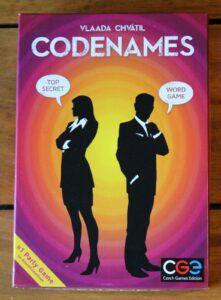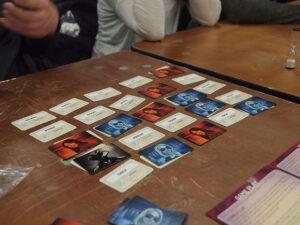
I played a physical copy of Codenames by Vlaada Chvátil. According to the box description, the game is intended for players 14 years old and up, for groups of families, friends, and board gamers. Codenames is a team-based word association game that involves two teams, a 5×5 board of cards, and a unique key card indicating which cards belong to which teams (red / blue). The objective of the game is for the Spymaster, who has access to the key card, to get his or her teammates to guess which cards on the board belong to their team; once all the cards on the board for one team are guessed, that team wins.
Player relationships are heavily focused on teamwork and communication. Spymasters need to be creative enough to connect multiple words they need to guess in one code word, while also avoiding any codeword that could accidentally insinuate the assassin card or any of the cards belonging to the other team. Because teams want to guess as many words on their turn as possible, Spymasters can further optimize their chances at winning by finding codewords that can insinuate multiple words. The guessing team must critically think to decipher the clues given by the Spymaster to guess their code words accurately. Therefore, Codenames encourages players to practice their cooperative, communication, and strategic thinking skills.

In Codenames, vulnerability arises from the need to trust and collaborate with teammates. Players must be open to sharing ideas and listening to others during discussions. However, the game does not require players to share personal information or experiences, so the level of vulnerability is relatively low compared to games like Truth or Dare or We’re Not Really Strangers, where players reveal personal details about themselves. However, in my playthrough, I found that common experiences and between players on the same teams has a significant impact in the game. For example, there was one moment where I was code master and the only cards left on my side were “Yellow” and “Ninja”. I proceeded to say “Uma 2” which left the other players baffled, but my friend was able to get it right away since he had also watched the Kill Bill and realized I was referencing a character in the film.



